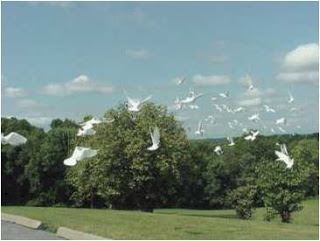Thanks to Patricia for your thoughtful comments. You have a lot of empathy for Iain’s problems.There is something here about being able to look life in the face and – somehow, despite everything it throws at us– carry on. It’s as simple (or as difficult) as the active acceptance of life as it is, the recognition of the circumstances in which we find ourselves and the determination to make of them the best we can.
This brings us back to Sisyphus, forever straining to roll his rock up the hill before watching it fall all the way back down again. The French writer Albert Camus has a great take on this story. He tells us that Sisyphus is happy. Happy because knows that there is no ultimate logic or purpose in what he is doing – and this gives him a sense of liberation. ‘There is no sun without shadow, and it is essential to know the night’. His fate belongs to him. He remains its master, his mind and body fully engaged in his chosen activity: ‘The struggle itself toward the heights is enough to fill a man's heart.’
And it reminds us of Nelson Mandela and his favourite poem, Invictus: ‘My head is bloody, but unbowed... I am the master of my fate: I am the captain of my soul’.
This way of looking at life can help us to engage, fully and knowingly, with the real and specific circumstances we find ourselves in: whether that’s the daily demands of work; the never-ending responsibilities and expectations of caring for young children; a long prison sentence on Robben Island; or living with physical disability or a chronic health problem. It brings with it a sense of dignity. Even when life is tough and we appear to have run out of luck, we can hold on to the belief that we are, indeed, worth it.
Back to my conversation with Iain. We sit in companionable silence for a while. Then I ask him, ‘What do you enjoy?’
 I don’t honestly expect much of a response. But I am wrong. Coming from nowhere that I had anticipated, he leans forward and starts to tell me about his passion for racing pigeons. He owns some fine specimens, he takes real pleasure in caring for them, and in how well they race. I realise the importance they have for him, in their freedom of movement, the beauty and grace of their flight. They encourage his imagination to take flight, reaching towards new unseen possibilities.
I don’t honestly expect much of a response. But I am wrong. Coming from nowhere that I had anticipated, he leans forward and starts to tell me about his passion for racing pigeons. He owns some fine specimens, he takes real pleasure in caring for them, and in how well they race. I realise the importance they have for him, in their freedom of movement, the beauty and grace of their flight. They encourage his imagination to take flight, reaching towards new unseen possibilities.
Our conversation ends at this point. The next time we meet, Iain says ‘You know doc, I can talk to you’. He still has problems with his feet, and tells me he is still drinking more than medical wisdom says he should (though his binges are less frequent and less severe). But now we have a basis for discussion, and a mutual respect which may - in time – enable us to change a few things together.